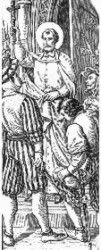Today, June 16, we celebrate the feast day of Saint John Francis Regis (1597-1640), gifted preacher, tireless confessor, and miracle worker. Referred to as “an angel” while he lived, Saint John Francis is remembered for his obvious and contagious faith, likened to that of the visible Holy Spirit burning within him. Rather than golden words and oratorical skills, Saint John’s life and faith were his tools, converting many and inspiring us even today.
Born in Fontcouverte in Languedoc, France, John Francis was raised in a wealthy noble Catholic family. From an early age, he demonstrated an affinity for holy pursuits, praying and fasting as a child. As early as five years old, Saint John Francis was committed to the Lord, fainting one day upon hearing his mother describe the fate of sinners—eternal damnation and separation from God! When he reached the age of 18, by his request, John Francis was sent to study with the Jesuits at the Jesuit college in Beziers, and one year later, with permission, became a member of the Society of Jesus at Toulouse.
His days in the novitiate were filled with hard work and rigorous study, and Saint John Francis excelled, becoming a model of obedience, faith, and steadfastness. Even so, he had a reputation for being hard on himself and easy on everyone else. His fellow novices were somewhat puzzled, and frequently annoyed by his behaviors, including his tendency to stay up through the night, praying. The novice, with whom he shared a room, commented, 'he vilifies himself beyond measure and he canonizes everyone else.' His roommate further spoke to the rector of the program, concerned that John Francis rarely slept. He said, "Regis seems never to go to bed, he's always on his knees during the night praying." Similarly, such was his love of the Lord, he refused to take the vacation times offered to him by his program of study. During these times set aside for relaxation, John Francis withdrew into private places to converse with God almost the whole day; and in the night, after a short sleep, he arose and stole secretly into the domestic chapel. Observed and reported by a member of the faculty, the rector instructed, “Interrupt not the sweet communications of that angel with God."
John Francis successfully completed his program, inspiring both his fellow seminarians and the faculty, and was ordained in 1630. Despite a plain desire to travel to the new world and minister to the native peoples there, Saint John Francis was retained in Toulouse to minister to victims of the plague. Even obedient, he remained and entered into his mission with such vigor that his superiors were concerned he would contract the disease himself. His young life was preserved by the Lord, however, and Saint John Francis went on to engage in many charitable works with the poor of Toulouse. Through his ministry, many were converted to Christianity, leading the rector to write to the Superior of the Jesuits, "Everybody agrees that Father Regis has a marvelous talent for the Missions." Based upon that recommendation, Saint John Francis was sent to the mission lands of France, where he converted many through his preaching and example of virtuous Christian living.
Saint John Francis Regis spent his days traveling on foot across the French countryside, and through the icy mountains. He stopped and preached to anyone he met, relying on their kindness and support for survival. Not known for a polished style or appearance, his simple method of preaching the Gospel, and his willingness to work for the poor, converted crowds of farmers, workers, and country folk. When his superiors and contemporaries voiced concern about his image, he replied, “The rich never lack confessors.” He lived off apples, black bread, and whatever came to hand, preferring to spend his time preaching, teaching, and hearing confessions. Oftentimes, after preaching all day, he would spend the entire night hearing confessions, with crowds of thousands lining up to spend a moment of spiritual guidance with him. One priest said of him, “I have seen him stand all day on a heap of snow at the top of a mountain preaching, and then spend the whole night hearing confessions.” All who heard him declared, that "Francis preached the word of God as it is in itself; whereas others seemed, in comparison of him, to preach themselves."
Despite his great success in ministry, some of his brethren remained critical of his approach, appearance, and demeanor. On one occasion, it was told him, “Look, these people you are ‘converting’- the conversion won't last.” His answer was, "So what? If I can keep a person from committing one sin that except for my efforts they would have committed, it's worth all my effort.” When he was complimented for his work, Saint John Francis replied “every time God converts a hardened sinner, He is working a far greater miracle.”
When not preaching, Saint John Francis engaged in continuous charitable work, for the improvement of many. He established hostels for prostitutes who wished to reform and leave the business, whom he referred to as “Daughters of Refuge.” He also engaged in preventative work, forming many societies and confraternities dedicated to the Blessed Sacrament. One such group, for example, helped country girls stay away from the cities (and turning to prostitution) by establishing them in the lace making and embroidery trade. Other societies focused on procuring food and aid for prisoners and the poor.
To the wealthier members of his Confraternities of the Blessed Sacrament, he offered the “gift” of a few hungry mouths to feed. In doing so, he would often send notes to those he encountered, instructing and encouraging them in the way of charity and love for others:
“Sir, you will provide food for the poor people who names are listed below, and you will give them six sous for their lodging. If you are unable to provide them with food, you will give them a further six sous so that they may buy it themselves.” This method of instruction proved successful, with even the most resistant members of society deepening their love of the poor and involvement in charitable work.
Again, his contemporaries were aghast at the manner in which he presented himself. Saint John Francis was never afraid to look ridiculous or beg on behalf of those in need. He was told, “Look, you're demeaning yourself [by begging]. It's humiliating.” His simple, and humble response, was, "Well, so much the better. The more humiliation, the more valuable… So that for thirty years I've been telling people, 'you don't practice real charity unless you are ready to be humiliated and often by the person towards whom you're trying to practice charity.’” Often laughed at by those who did not know his intent or the courage and love of his heart, he proudly would proclaim, "With all my heart, we receive a double advantage when we purchase a brother's relief with our own disgrace."
Numerous miracles were reported through his intercession, even while alive, including the healing of a poor widow’s sons after she generously volunteered to mend his ragged cloak during a freezing winter. He further established a granary for the poor which sometimes miraculously refilled to the point that even the door could not be fully opened. Less miraculous, but still quite impressive, Saint John Francis demanded and received treatment for the poor and those unable to pay by doctors, nurses, and pharmacists—all of whom, won over by his fervent faith and model life of virtue, generously donated their time and services
Saint John Francis further engaged in rigorous mortification, which he had begun as a child. Fasting and penance were standard practice, and these did little to dull his bright spirit, patience, and warm disposition. As he returned to the house one evening after a hard day's toil, one of his brothers laughingly asked, "Well, Father Regis, speaking candidly, are you not very tired?" He reportedly laughed as well, stating. "No, I am as fresh as a rose." In repentance for his sins, and those of others, he limited his food intake to milk and a bit of fruit each day, and refused to sleep in a bed—preferring to sleep on the floor of his room.
Saint John Francis spent many of his last days ministering and preaching in the icy mountains at Marthes. On one occasion, while traveling over a dangerous mountain path, the ledge he was crossing gave way, and the saint fell and broke his leg. With the assistance of his companions, he managed to walk the remaining 6 miles to the church he was headed for, and refusing medical help, went straight to the confessional where he heard confessions for most of the night. When he finally allowed a doctor to examine him, his leg had miraculously mended. At age 43, Saint John Francis had a premonition of his death. He spent three days in prayer, made a general confession, and resumed his mission in mountain villages. Despite bad weather, he spent his days preaching, seeking shelter wherever he could at night—oftentimes cold and exposed to the elements. He eventually developed pleurisy and then pneumonia. His last words were “Jesus, my Savior, I recommend my soul to You. Into Your hands I command my spirit.” His relics were interred at Louvesc in the mountains, and remains a site of pilgrimage for the faithful. He was canonized by Pope Clement XII in 1737.
Saint John Francis Regis was so inflamed with the love of the Lord, his every word, breath, and action seemed to cry out to Him. Those who encountered this holy man were changed, drawn closer to the Lord through his example of virtuous living and love. He was not a man of great words, but rather of a simple faith lived loudly for those around him to witness. The profound influence of Saint John Francis Regis reminds us that our actions are just as important as our words—that the way in which we live our everyday life can be a powerful witness to others of the Love of God. Today, we are called to reflect on whether our actions match our words and reflect our beliefs and our faith.
Inspired by the origins and spiritual history of the Holy Rosary, we continue our meditation on the psalms, one each day, in order, for 150 days.
Today’s Psalm: Psalm 52: The Deceitful Tongue
1 Why do you boast of evil, you mighty man?
Why do you boast all day long,
you who are a disgrace in the eyes of God?
2 Your tongue plots destruction;
it is like a sharpened razor,
you who practice deceit.
3 You love evil rather than good,
falsehood rather than speaking the truth.
4 You love every harmful word,
O you deceitful tongue!
5 Surely God will bring you down to everlasting ruin:
He will snatch you up and tear you from your tent;
he will uproot you from the land of the living.
6 The righteous will see and fear;
they will laugh at him, saying,
7 "Here now is the man
who did not make God his stronghold
but trusted in his great wealth
and grew strong by destroying others!"
8 But I am like an olive tree
flourishing in the house of God;
I trust in God's unfailing love
for ever and ever.
9 I will praise you forever for what you have done;
in your name I will hope, for your name is good.
I will praise you in the presence of your saints.
Day 167 of 365
Prayer Intentions: Simple faith and obedience; Hearts that burn for the Lord; the ability to witness to others through our actions.
Requested Intentions: : Prosperity, health, healing, and conversion for a family (M); Health and healing of a mother (A); Healing of heart and mind (T); Healing of a new relationship before marriage (K); Healing of a relationship (T); Eternal rest for the dearly departed, end to financial struggles, successful sale of home, ability to travel on pilgrimage (L); Financial security of a family, healing of relationships, end to addiction, direction for a family member (L); For healing of a stomach illness (L); For the repose of the soul of a sister (C); Vocational security for family, Financial security for daughter beginning college (M); Vocational guidance, courage and strength (I); Reconciliation of a relationship (M); Strength, financial security, motivation, repose of a loved one (V); Recovery of left shoulder fracture (E); Financial recovery (A); The repose of a lonely soul (L); Health for an ailing nephew (A); Those suffering from depression (J); Successful adoption (S); Healing of a father battling cancer (S).
Psalm: Psalm 52: The Deceitful Tongue










May God Bless you. keep up the good work. I loved your blog. May Mother Mary be with you & intercede for you.
ReplyDeleteMy mom is weak need healing , I love her deeply. Her name is Dolly , please pray for her.
ReplyDelete